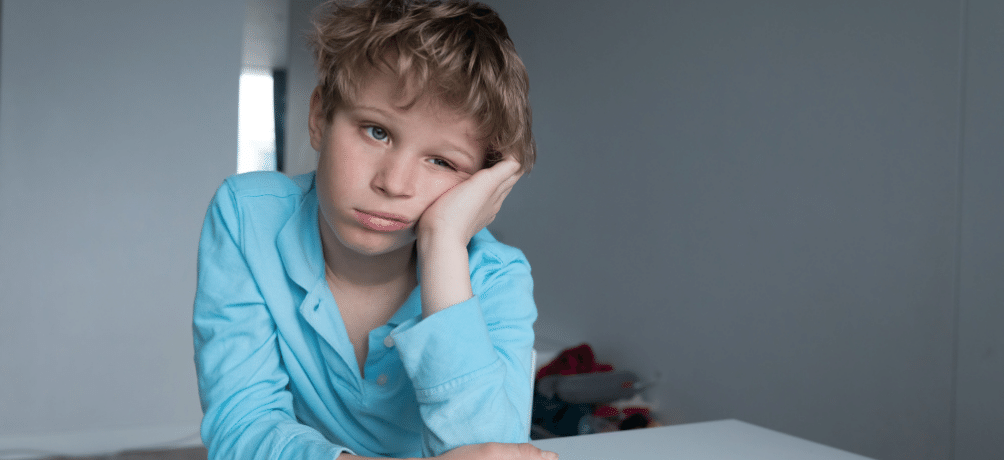Helping Kids Cope with School Anxiety
By Dr. Mary Rooney, Ph.D.
Heading back to school during a typical school year causes many students to experience feelings of anxiety and worry. When you layer on the added challenges that come with returning to in-person learning during the COVID-19 pandemic, feelings of anxiety are even more common and, in some cases, more severe. While remote learning has kept students engaged in the academic aspects of school all year long, students haven’t been exposed to the additional stressors that come with attending school in person.
At school, students are navigating complex social situations, dealing with noisy and crowded hallways, following their school’s COVID-19 social distancing protocols, adjusting to their teacher’s in-person learning style, and keeping track of their supplies, assignments, and belongings in a crowded classroom. It’s not surprising that many students are experiencing anxiety when they return to school. Fortunately, there are many things parents can do to help students manage their anxiety and worries.
- Accept and acknowledge your child’s feelings. Everyone feels anxious sometimes, and it’s normal for your child to feel some anxiety under the current circumstances. Encourage them to talk to you about their feelings. Listen to what they have to say and empathize with them. Avoid minimizing or dismissing their feelings by telling them that there’s nothing to worry about or that everything will be fine. This type of response can cause kids to shut down or make them feel like their parents don’t understand.
- Listen for clues about what is driving your child’s anxiety. Children feel anxious about school for many different reasons. Some are anxious about being separated from their parents or being away from home all day. Others are experiencing social anxiety, and some feel more general anxiety about going into a situation that feels unknown and unfamiliar. When you have a sense of the things that are driving your child’s anxiety, you’re better equipped to help them deal with it.
- Teach your child about anxiety. Anxiety is less frightening when kids can identify it and have a strategy for managing uncomfortable thoughts and feelings. Most children don’t know how to recognize the signs of anxiety, like tense muscles, “what if” thoughts, or butterflies in their stomachs. Teaching them how to recognize these signs and a brief mindfulness strategy that they can use in response, like slow breathing or visualizing a happy place, can help children feel more in control of their anxious feelings. There are many great books that teach children about anxiety, including:
- Find Your Calm: A Mindful Approach to Relieve Anxiety and Grow Your Bravery by Gabi Garcia
- A Little SPOT of Anxiety: A Story About Calming Your Worries by Diane Alber
- CBT Workbook for Kids by Heather Davidson, PsyD
- The Worry Workbook for Kids by Muniya Khanna, PhD and Deborah Ledley, PhD
- Encourage involvement in extracurricular activities at school. When students participate in activities they enjoy, they’ll have more opportunities to make friends with students who share their interests, and they’ll have something to look forward to as they head off to school each morning.
- Celebrate their success. When your child has been brave and has had a ‘good day’ at school, let them know that you’re proud of them. Consider planning a fun activity for the weekend to celebrate their success at school during the week.
While some mild or moderate school anxiety is normal, there are times when a child’s anxiety becomes more severe and requires treatment from a mental health professional. Signs that your child may need treatment for their anxiety symptoms include:
- Anxious thoughts or physical symptoms, like frequent stomachaches or headaches (without a medical cause), that cause your child to refuse to attend school or make it extremely difficult for you to get them to school each day.
- Difficulty falling asleep or staying asleep most nights.
- Difficulty participating in academic or social activities during the school day.
Your pediatrician or school counselor should be able to recommend a mental health provider in your area who treats children who are struggling with anxiety. Therapy for anxiety disorders in children is highly effective, so don’t hesitate to seek treatment if your child is struggling.
ABOUT DR. MARY ROONEY
Mary Rooney, Ph.D., is a licensed clinical psychologist in the Department of Psychiatry at the University of California San Francisco. Dr Rooney is a researcher and clinician specializing in the evaluation and treatment of ADHD and co-occurring behavioral, anxiety, and mood disorders. A strong advocate for those with attention and behavior problems, Dr. Rooney is committed to developing and providing comprehensive, cutting edge treatments tailored to meet the unique needs of each child and adolescent. Dr. Rooney's clinical interventions and research avenues emphasize working closely with parents and teachers to create supportive, structured home and school environments that enable children and adolescents to reach their full potential. In addition, Dr. Rooney serves as a consultant and ADHD expert to Huntington Learning Centers.
ABOUT HUNTINGTON
Huntington Learning Center is the tutoring and test prep leader. Its certified tutors provide individualized instruction in reading, phonics, writing, study skills, elementary and middle school math, Algebra through Calculus, Chemistry, and other sciences. It preps for the SAT and ACT, as well as state and standardized exams. Huntington programs develop the skills, confidence, and motivation to help students of all levels succeed and meet the needs of Common Core State Standards. Founded in 1977, Huntington's mission is to give every student the best education possible. Call us today at 1.800.CAN LEARN to discuss how Huntington can help your child. For franchise opportunities please visit www.huntingtonfranchise.com.
This website does not provide medical advice, diagnosis, or treatment. The material on this site is provided for educational purposes only.

